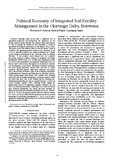Political economy of integrated soil fertility management in the Okavango Delta, Botswana
Date
2013Author
Kolawole, Oluwatoyin Dare
Mogobe, Oarabile
Magole, Lapologang
Publisher
World Academy of Science, Engineering and Technology, https://www.waset.orgType
Published ArticleMetadata
Show full item recordAbstract
Although many factors play a significant role in agricultural production and productivity, the importance of soil fertility cannot be underestimated. The extent to which small farmers are able to manage the fertility of their farmlands is crucial in agricultural development particularly in sub-Saharan Africa (SSA). This paper assesses the nutrient status of selected farmers’ fields in relation to how government policy addresses the allocation of and access to agricultural inputs (e.g. chemical fertilizers) in a unique social-ecological environment of the Okavango Delta in northern Botswana. It also analyses small farmers and soil scientists’ perceptions about the political economy of integrated soil fertility management (ISFM) in the area. A multi-stage sampling procedure was used to elicit quantitative and qualitative information from 228 farmers and 9 soil researchers through the use of interview schedules and questionnaires, respectively. Knowledge validation workshops and focus group discussions (FGDs) were also used to collect qualitative data from farmers. Thirty-three composite soil samples were collected from 30 farmers’ plots in three farming communities of Makalamabedi, Nokaneng and Mohembo for laboratory analysis. While meeting points exist, farmers and scientists have divergent perspectives on soil fertility management. Laboratory analysis carried
out shows that most soils in the wetland and the adjoining dryland/ upland surroundings are low in essential nutrients as well as in cation exchange capacity (CEC). Although results suggest the
identification and use of appropriate inorganic fertilizers, the low CEC is an indication that holistic cultural practices, which are beyond mere chemical fertilizations, are critical and more desirable for
improved soil health and sustainable livelihoods in the area. Farmers’ age (t= -0.728; p≤0.10); their perceptions about the political economy (t = -0.485; p≤0.01) of ISFM; and their preference for the use of local knowledge in soil fertility management (t = -10.254; p≤0.01) had a significant relationship with how they perceived their involvement in the implementation of ISFM.
Collections
- Research articles (ORI) [270]

